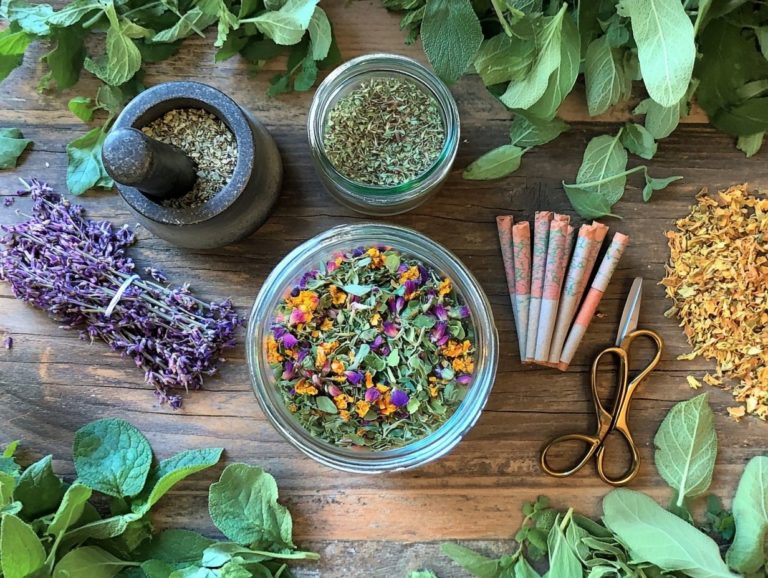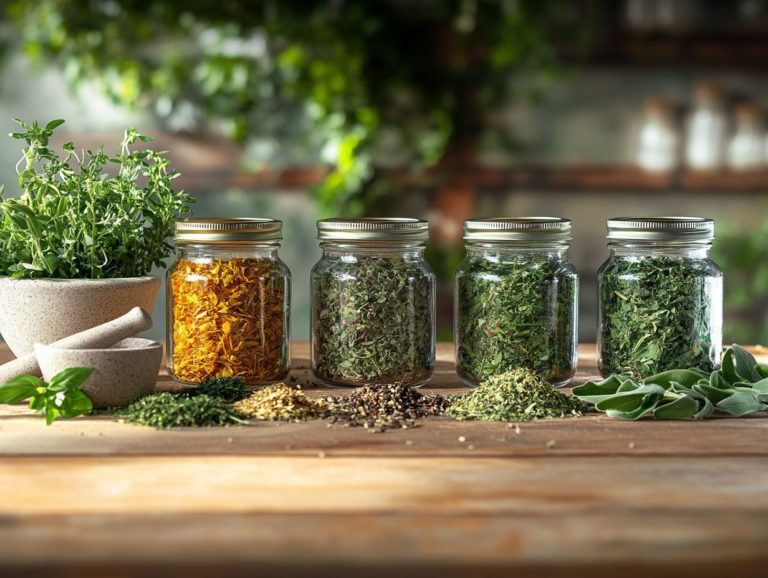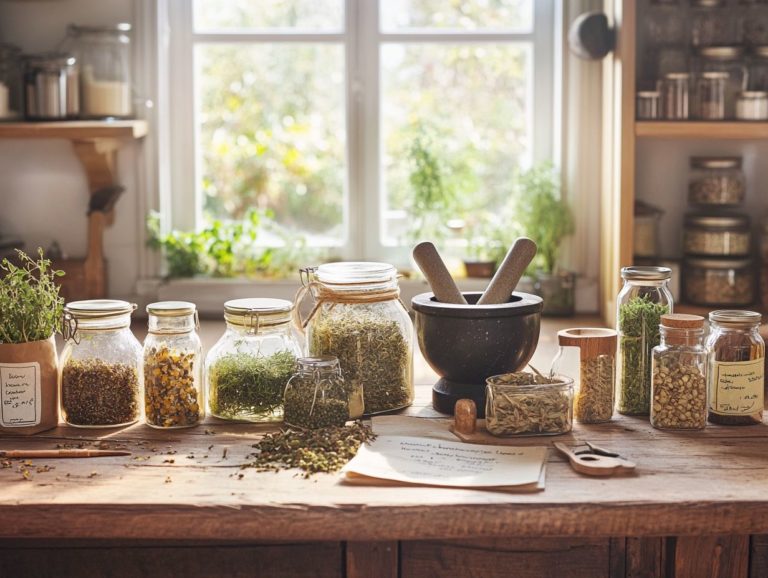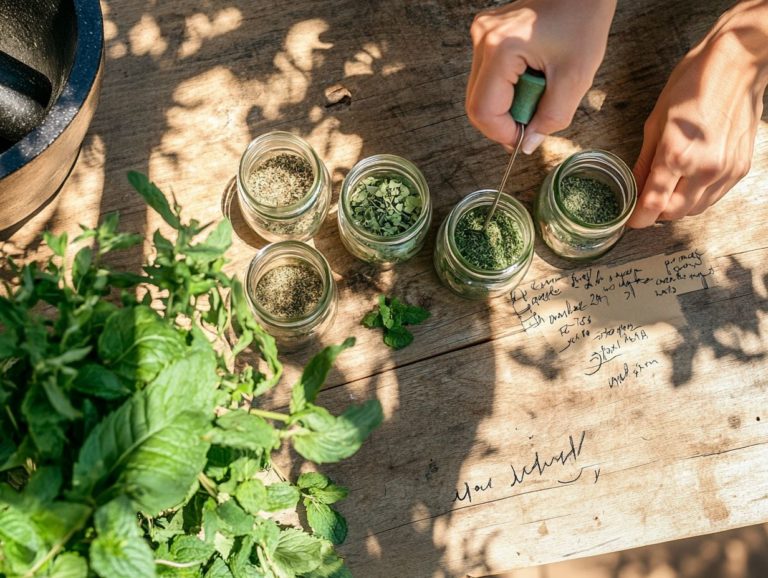5 Traditional Herbal Remedies You Can Make
In a world that increasingly embraces natural healing, traditional herbal remedies present a wealth of benefits for common ailments.
Consider the soothing effects of ginger tea for nausea or the anti-inflammatory properties of turmeric paste these time-honored solutions have truly stood the test of time.
You can explore five effective herbal remedies that are simple to prepare at home, complete with insights into their health benefits, potential side effects, and practical tips for weaving them seamlessly into your daily routine.
Uncover how these natural wonders can elevate your well-being!
Contents
- Key Takeaways:
- 1. Ginger Tea for Nausea and Digestive Issues
- 2. Turmeric Paste for Inflammation and Pain Relief
- 3. Peppermint Oil for Headaches and Muscle Tension
- 4. Echinacea Tincture for Immune System Boost
- 5. Chamomile Tea for Relaxation and Better Sleep
- How Do Traditional Herbal Remedies Work?
- What Are the Benefits of Using Traditional Herbal Remedies?
- What Are the Possible Side Effects of Traditional Herbal Remedies?
- How Can One Incorporate Traditional Herbal Remedies into Their Daily Routine?
- Are There Any Precautions to Take When Using Traditional Herbal Remedies?
- What Are Some Other Traditional Herbal Remedies That Can Be Made at Home?
- Frequently Asked Questions
Key Takeaways:
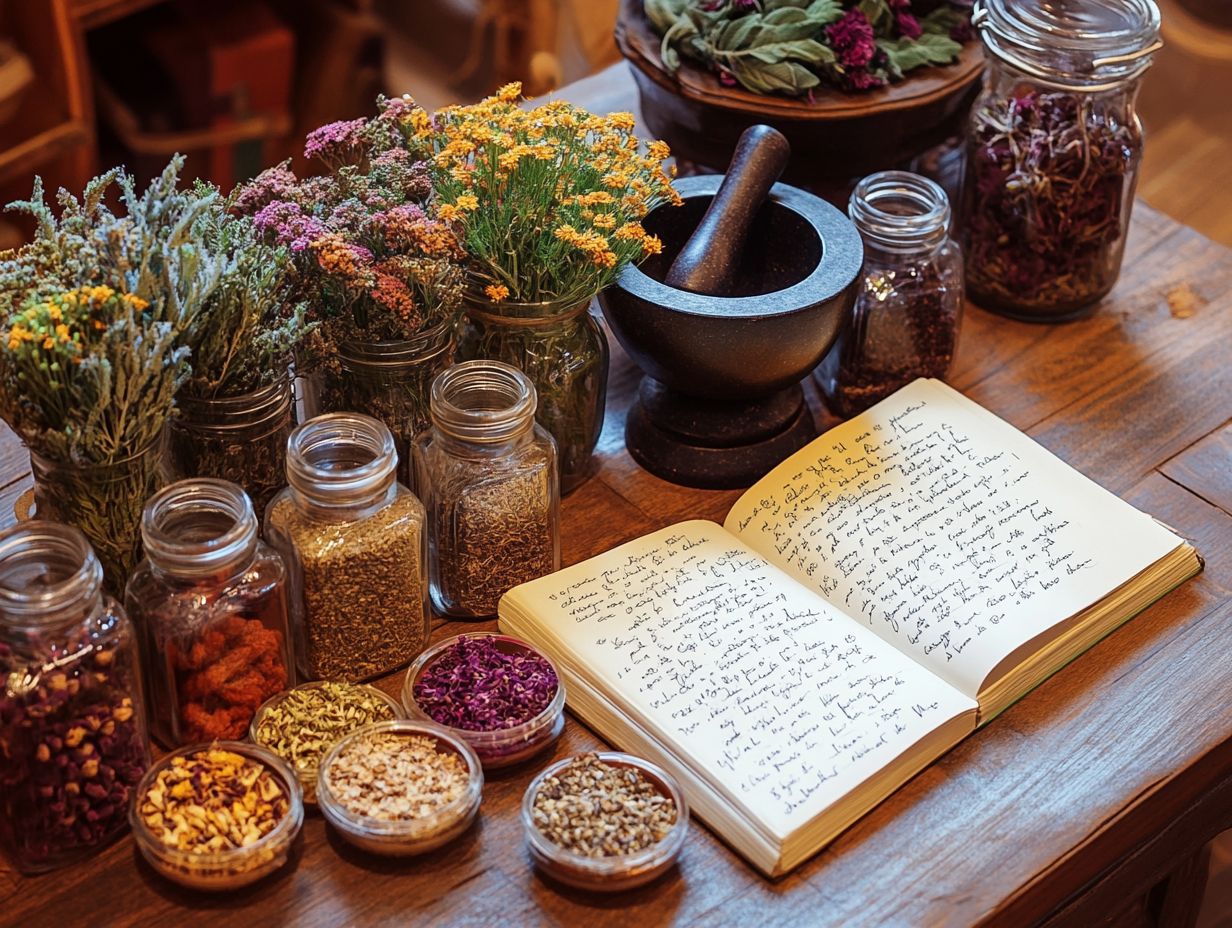
- Ginger tea can ease nausea and digestive problems. It’s easy to make at home and can provide quick relief.
- Turmeric paste helps relieve pain with anti-inflammatory properties. It can be applied topically or ingested.
- Peppermint oil is great for headaches and muscle tension. It’s a natural alternative to over-the-counter pain relievers.
1. Ginger Tea for Nausea and Digestive Issues
Ginger tea is a remarkable natural remedy esteemed for its medicinal qualities, especially when it comes to alleviating nausea and digestive troubles. It has earned its place as a staple in herbal medicine and traditional remedies across the globe.
Ginger tea comes from the ginger plant. It’s known for helping with inflammation and digestion, offering you a comforting solution for digestive discomfort and nausea.
To create this invigorating beverage, simply steep fresh ginger slices in boiling water for about ten minutes, allowing those rich, spicy flavors to meld beautifully.
Renowned for its effectiveness, particularly for expectant mothers battling morning sickness, ginger tea has the backing of scientific studies that showcase its ability to reduce nausea in various situations. Traditionally, it has provided relief for individuals suffering from motion sickness and has eased symptoms of indigestion.
Research also supports its benefits; studies suggest that ginger can enhance stomach movement, making this delightful drink not only comforting but also a valuable ally in promoting digestive health.
2. Turmeric Paste for Inflammation and Pain Relief
Turmeric paste is an amazing natural remedy known for its powerful ability to reduce inflammation. It offers a compelling solution for pain relief and serves as a valuable addition to herbal supplements aimed at enhancing your overall health.
At the heart of this vibrant paste is curcumin, its key active ingredient, which has found its place in traditional medicine practices across Asia for centuries particularly in Ayurvedic and Traditional Chinese Medicine. It has long been appreciated not just for its striking color but also for its impressive healing potential.
You can easily create this exceptional compound by mixing ground turmeric with water, oil, or even honey, resulting in a paste that can be applied topically or consumed. Recent scientific studies lend credence to historical claims, showcasing curcumin’s ability to effectively reduce inflammation. This makes it a promising alternative for those exploring options outside conventional pain management methods.
3. Peppermint Oil for Headaches and Muscle Tension
Peppermint oil stands out as a remarkable herbal remedy for alleviating headaches and muscle tension, thanks to its soothing cooling sensation and analgesic properties. It s no wonder many individuals turn to this natural solution for comfort.
Not only is this essential oil celebrated for its delightful aroma, but it also boasts scientifically backed benefits for easing discomfort. Research indicates that inhaling peppermint oil can boost cognitive performance while simultaneously reducing headache severity.
You ll find various application methods at your disposal; whether it s massaging diluted oil onto your temples or neck, using a diffuser for inhalation, or adding it to a warm bath, each method can offer significant relief.
Its prominent role in herbal medicine beautifully marries tradition with modern validation, making it an invaluable asset in your holistic wellness toolkit.
Try these herbal remedies today and discover the soothing power of nature!
4. Echinacea Tincture for Immune System Boost
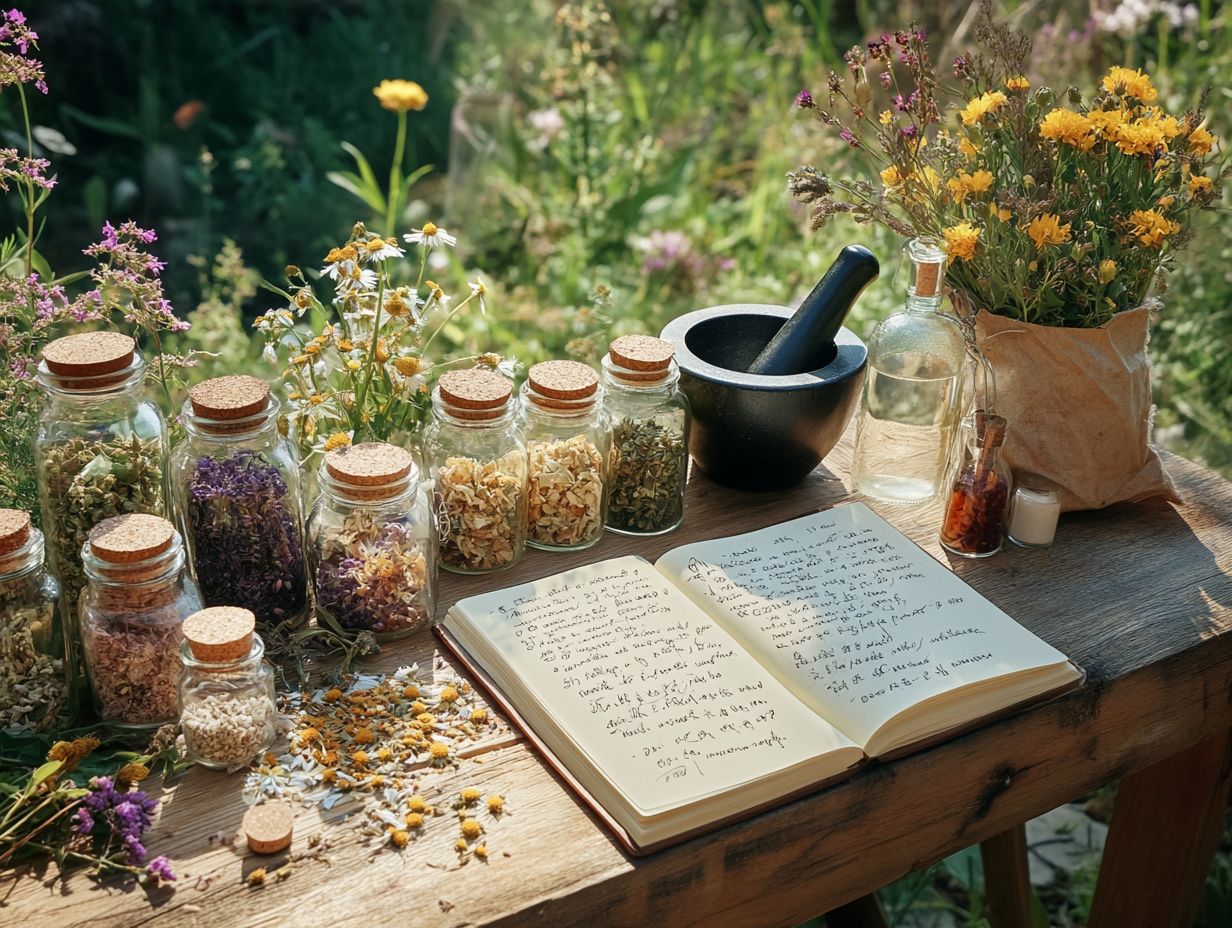
Echinacea tincture is celebrated for its immune-boosting properties. It is a formidable ally against colds and enhances overall health.
Derived from the vivid Echinacea plant, this herbal remedy offers myriad health benefits. Research shows that certain natural compounds found in Echinacea help your body fight infections.
Preparing Echinacea tinctures typically involves steeping the dried roots or aerial parts of the plant in alcohol or glycerin, effectively extracting its beneficial compounds. For those interested in a broader range of natural solutions, exploring DIY herbal remedies for digestive health can complement holistic health practices, promoting wellness and a natural approach to disease prevention.
5. Chamomile Tea for Relaxation and Better Sleep
Chamomile tea stands as a timeless herbal remedy, revered for its calming qualities that encourage relaxation and promote restful sleep. It is your reliable solution when grappling with anxiety and sleepless nights.
The soothing effects of this beloved brew can be traced back to its abundant flavonoids and terpenoids, compounds known to engage with the brain’s receptors. For generations, chamomile has been a staple in herbal medicine, addressing a range of ailments from digestive troubles to menstrual discomfort.
To fully unlock its therapeutic potential, consider optimal preparation techniques. Steeping dried chamomile flowers in hot water for at least five to ten minutes can significantly enhance its benefits. For those interested in natural solutions, exploring 5 must-try herbal preparations for better sleep can be beneficial. Recent studies have shown that regular consumption of this fragrant elixir can lead to marked reductions in anxiety and noticeable improvements in sleep quality.
How Do Traditional Herbal Remedies Work?
Traditional herbal remedies work by harnessing the natural properties of medicinal plants, a practice revered for centuries. These remedies provide health benefits through holistic healing, blending the wisdom of past generations with contemporary natural medicine.
Herbal treatments interact intricately with your body’s systems, influencing pathways like inflammation, immunity, and digestive health. For instance, compounds found in ginger enhance circulation and combat inflammation, while turmeric is celebrated for its antioxidant properties that support cellular health. Additionally, exploring 5 herbal remedies for skin conditions can provide further insights into natural solutions for your skin health.
By understanding how these herbs operate, you can effectively integrate them into your modern healthcare routine. This allows for a comprehensive approach to wellness. As traditional medicine gains recognition, it opens the door for a collaborative future where herbal knowledge complements scientific advancements, enhancing patient care and deepening your appreciation for nature’s remarkable healing gifts, including the top 5 DIY herbal remedies for stress relief.
What Are the Benefits of Using Traditional Herbal Remedies?
Using traditional herbal remedies presents you with a wealth of benefits, including holistic health enhancements and natural treatment options for various ailments. These remedies come with a significantly lower risk of side effects compared to synthetic alternatives.
Incorporating these remedies into your daily routine can elevate both your emotional resilience and physical well-being. Take garlic, for instance; it s famous for its immune-boosting qualities, helping you fend off infections while promoting cardiovascular health by lowering blood pressure and cholesterol levels.
Then there’s ginger, celebrated for alleviating digestive issues, reducing inflammation, and easing stress. This makes it a go-to for those in search of natural remedies.
Embrace these powerful herbal treatments now! You’ll experience a remarkable boost in your well-being and find balance in both body and mind while connecting with time-honored traditions.
What Are the Possible Side Effects of Traditional Herbal Remedies?

Understanding is key! Grasping the quality of the herbs you’re using is essential, especially since traditional herbal remedies often come with a reputation for safety. However, they can present potential side effects.
Certain herbs can interfere with pharmaceuticals, particularly blood thinners like warfarin. This can heighten the risk of bleeding or reduce the medication’s effectiveness. Before incorporating these remedies into your health routine, consult with a healthcare provider.
The lack of regulatory oversight in the herbal market means that variations in potency (strength) and purity (cleanliness) are common. Therefore, quality control is paramount.
By being aware of these factors, you can enjoy the benefits of herbal treatments while minimizing any adverse effects.
How Can One Incorporate Traditional Herbal Remedies into Their Daily Routine?
Incorporating traditional herbal remedies into your daily routine can significantly enhance your overall wellness. These remedies offer natural solutions to health concerns while fostering a balanced lifestyle with the aid of herbal supplements.
Consider adding herbs like turmeric, ginseng, and chamomile to your meals or beverages. For instance, turmeric can be blended into your morning smoothies or warm golden milk, giving your breakfast a delightful kickstart while supporting anti-inflammatory properties. You might also explore 5 common herbs with healing properties that can enhance your overall well-being.
In the afternoon, enjoy ginseng as a soothing tea. It delivers a gentle energy boost and mental clarity perfect for those post-lunch slumps. As the day winds down, sipping chamomile tea can promote relaxation and enhance sleep quality, making it an ideal choice to unwind after a busy day.
Are There Any Precautions to Take When Using Traditional Herbal Remedies?
Taking precautions when using traditional herbal remedies is crucial for your safety and effectiveness. Consult with healthcare providers, especially if you re considering combining herbs with conventional medications.
Be aware of specific dosage guidelines. Exceeding the recommended amount of an herbal remedy can lead to unwanted side effects. It’s equally important to understand potential interactions with other treatments; some herbs can enhance or diminish the effects of prescribed drugs, complicating your health journey. For those interested in creating their own solutions, consider crafting your own herbal remedies at home.
Sourcing high-quality herbs is essential. This significantly reduces the risk of contamination or adulteration, ensuring that what you consume is both safe and beneficial. By prioritizing these precautions, you can navigate the intricate world of herbal remedies with confidence. For delicious options, consider trying 5 delightful DIY herbal teas for wellness.
What Are Some Other Traditional Herbal Remedies That Can Be Made at Home?
Creating traditional herbal remedies at home can be incredibly fulfilling and beneficial. It allows you to harness the power of herbs like feverfew, garlic, and lavender to address various health concerns.
As you dive into these natural solutions, you’ll tackle ailments such as headaches or anxiety while gaining a deeper appreciation for the rich traditions of herbal medicine. Each herb possesses unique properties, and learning to prepare homemade herbal salves reveals effective ways to support your overall wellness.
For instance, feverfew is renowned for its potential to ease migraine pain. Meanwhile, garlic offers impressive immune-boosting qualities. Lavender can be utilized in calming teas or infused oils, promoting relaxation and restful sleep. If you’re interested in exploring more about herbal preparations, consider learning about creating your own capsules.
Embarking on this journey opens up a world of knowledge, giving you the power to take charge of your health in a natural and holistic way. Ready to explore the benefits of herbal remedies? Start your journey today!
Frequently Asked Questions
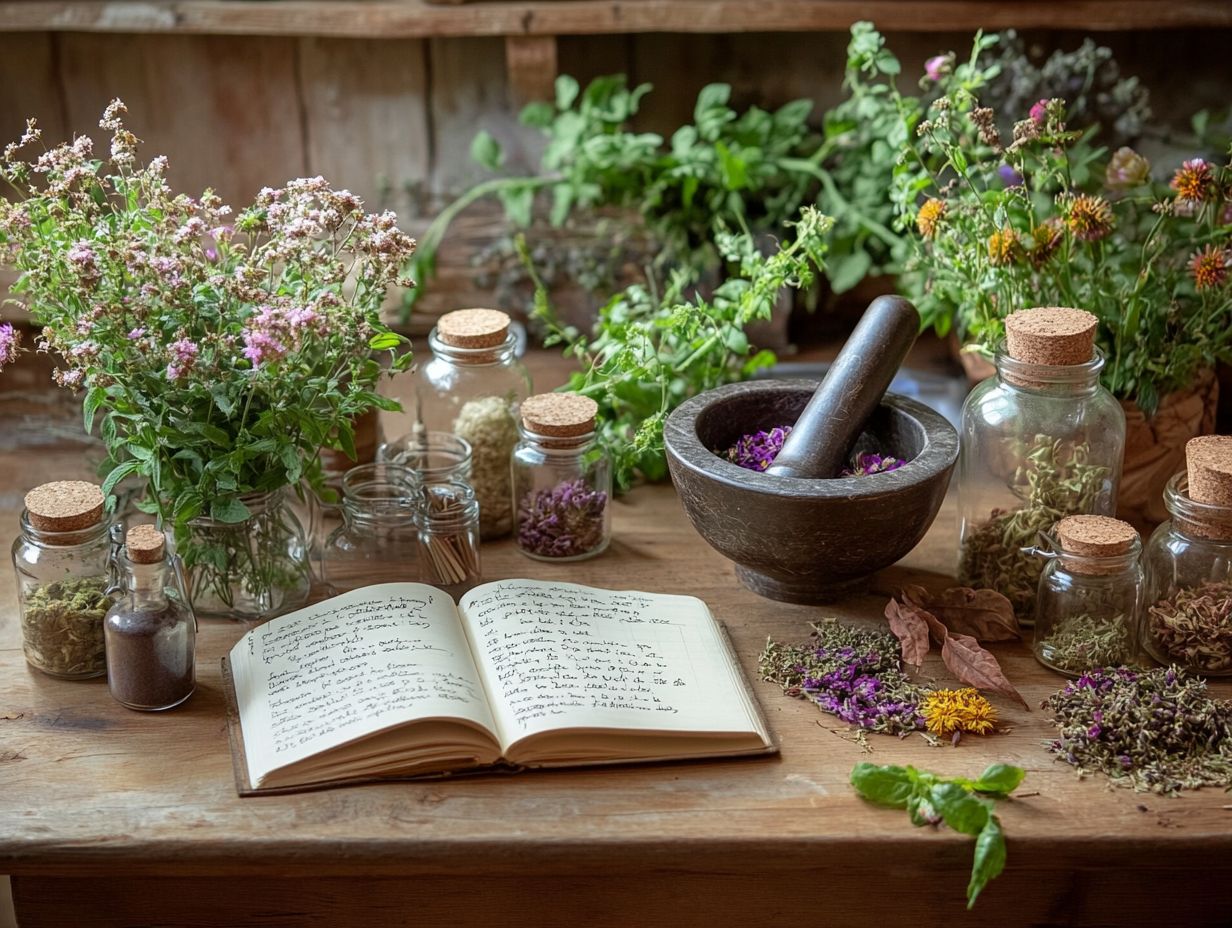
What are traditional herbal remedies?
Traditional herbal remedies refer to natural treatments using plants and plant extracts that have been used for centuries to promote health and well-being.
Can I make my own herbal remedies?
Absolutely! You can whip up your own herbal remedies right at home using plants from your garden or herbs from a health food store.
What are some common herbal remedies I can make?
Try ginger tea for an upset stomach or garlic oil for ear infections. Chamomile compresses can also soothe skin irritations.
What are the benefits of using herbal remedies?
Herbal remedies can help treat common ailments and boost your immune system. They promote overall wellness and can be a natural alternative to synthetic medications.
Are there any risks associated with herbal remedies?
While generally safe, it’s important to consult with a healthcare professional before trying new remedies. This is especially crucial if you have health conditions or are on medication.
Can I combine different herbs for a remedy?
Yes! Combining herbs can enhance their effects. Just be sure to research how they interact and the potential effects of each herb before mixing them.


